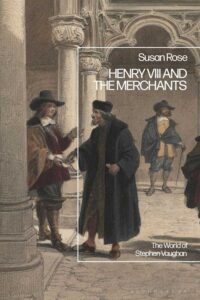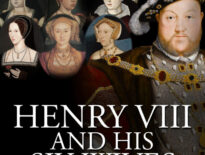Susan Rose is now retired but was a Senior lecturer and later a research fellow at Roehampton. She worked for over 30 years for the Open University in various roles and has written books on both medieval ships and also late medieval and early modern trade. Here, she shares an article about Henry VIII and shares some information about Stephen Vaughan. She has written a book entitled "Henry VIII and the Merchants" which available here.
 Building on my knowledge and understanding of the world of traders and its importance to the rulers of England detailed in my book, The Wealth of England (Oxbow 2018) my research and new book takes the reader from the bustle and brilliance of Antwerp, the hub of European trade and finance in the early sixteenth century to the courts of Henry VIII, the Regent of the Netherlands, and the Emperor Charles V.
Building on my knowledge and understanding of the world of traders and its importance to the rulers of England detailed in my book, The Wealth of England (Oxbow 2018) my research and new book takes the reader from the bustle and brilliance of Antwerp, the hub of European trade and finance in the early sixteenth century to the courts of Henry VIII, the Regent of the Netherlands, and the Emperor Charles V.
Stephen Vaughan a young London Merchant Adventurer who became an assistant and friend of Thomas Cromwell. Through that connection, he was drawn into the world of the court in London and the service of the King abroad. At first, he combined negotiations over the trading privileges of English merchants in the booming markets of Antwerp with personal commissions for Cromwell, buying books or items like a globe or a chest for private papers.
As a convinced supporter of the reformed religion, though never a member of any sect, Vaughan also had close contact with William Tyndale the translator of the Bible into English and frequently sent word back to London of plots by those seeking to undermine the King’s policies. More serious diplomatic missions for the Crown involved visits to Lutheran princes and an attempt to convince the Regent of the Netherlands Charles V’s sister that another sister, the Duchess of Milan, would make a fine bride for Henry.
After Cromwell's fall and execution, he was drawn closer to the King and the Privy Council and was finally charged with raising the emergency financing necessary if Henry was to join Charles in a war against France in 1543-6. This entailed obtaining loans on the Antwerp Bourse, the centre of the money market of the day. No English King had done this previously and royal advisers had no experience at all in this kind of operation. Vaughan had to deal with a complex tangle of differing coinages, exchange rates which changed rapidly in response to the news of the day, and networks of experienced brokers and bankers always out for their own advantage.
His letters to London bewail those he had to deal with who were, 'foxes and wolves which are shrewd beasts whose natures are well known to your Honors.' The broker he was forced to use, Gaspare Ducci, was an essential contact with the Fuggers and other bankers but was 'so greedily hunting after gain' for himself that it was hard to trust him.
Vaughan's personal life showed him to be a loving father, especially to his carefully educated daughters. Anne became a convinced Protestant and has become renowned as a poet under her married name, Anne Locke Vaughan. Jane, later Wiseman, took a different path as a heroine of the recusants in Elizabeth’s reign by harbouring the Jesuit, John Gerrard.
About the book
Drawing heavily from the State Papers of the King, Henry VIII and the Merchants traces Stephen Vaughan's careers as a servant of Thomas Cromwell and of Henry VIII in the 16th century.
Stephen Vaughan, a Londoner with an international outlook, was a member of the Company of Merchant Taylors, as well as a Merchant Adventurer in the Low Countries. As a young man Vaughan was drawn into the employ of Thomas Cromwell and worked in his private office. Thus, Vaughan became heavily involved in the world of government and court politics at a time when the style, tempo and effectiveness of official life in London was changing rapidly and the world was quickly opening up as his travels to Europe drew him into the enticing world of business and finance.
For the first time, this notable study uncovers the secrets of Vaughan's life from his relatively humble beginning to his high-power career as an ambassador, spy, and financial agent of the crown on the Bourse at Antwerp. What is more, on a wider canvas this intimate tale shows how individuals were affected by and reacted to the drastic changes in religion, politics and everyday life under the tumultuous reign of Henry VIII.



Leave a Reply